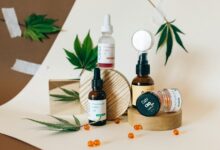Does Cbd Contain Thc

The relationship between CBD and THC is complex. Many consumers wonder whether CBD products contain THC and, if so, in what amounts. Full-spectrum CBD oils may include trace levels of THC, while CBD isolate products are formulated to be entirely THC-free. This distinction is significant for those concerned about psychoactive effects or legal implications. Understanding these differences is essential for making informed choices about CBD consumption. What factors should one consider when selecting a CBD product?
Understanding CBD and THC: The Basics
Cannabidiol (CBD) and tetrahydrocannabinol (THC) are two of the most prominent compounds found in the cannabis plant.
CBD is known for its potential health benefits, including pain relief and anxiety reduction, without psychoactive effects.
In contrast, THC is primarily recognized for its psychoactive effects, contributing to the "high" associated with cannabis.
Understanding these compounds is essential for informed choices regarding cannabis use.
The Presence of THC in CBD Products
While many consumers seek out CBD products for their therapeutic benefits, it is crucial to clarify the presence of THC in these products.
The THC content in CBD items varies based on the method of CBD extraction. Full-spectrum oils may contain trace amounts of THC, while isolate products typically have none.
Understanding these distinctions helps consumers make informed choices regarding their use of CBD.
Legal Considerations Surrounding CBD and THC
What are the legal implications of using CBD products that may contain THC?
The regulatory framework surrounding CBD and THC varies significantly by jurisdiction. In many areas, CBD derived from hemp is legal, provided THC levels remain below 0.3%.
However, products exceeding this threshold may face legal challenges. Consumers must remain informed about local laws to avoid potential legal repercussions.
Choosing the Right CBD Product for Your Needs
When selecting a CBD product, individuals should consider several factors to ensure it aligns with their specific needs and preferences.
Key considerations include understanding product types, such as oils, edibles, or topicals, and adhering to dosage guidelines for optimal effectiveness.
Researching third-party testing and ingredient sourcing can also enhance confidence in product quality, empowering consumers to make informed choices that promote personal wellness.
Conclusion
In conclusion, understanding the relationship between CBD and THC is essential for consumers navigating the diverse range of products available. Approximately 60% of CBD users report that they prefer full-spectrum products for the entourage effect, which maximizes potential benefits by utilizing the full range of cannabinoids. By recognizing the THC content in various CBD products, individuals can make informed choices that align with their health goals and legal requirements, ensuring a safer and more satisfying experience.





